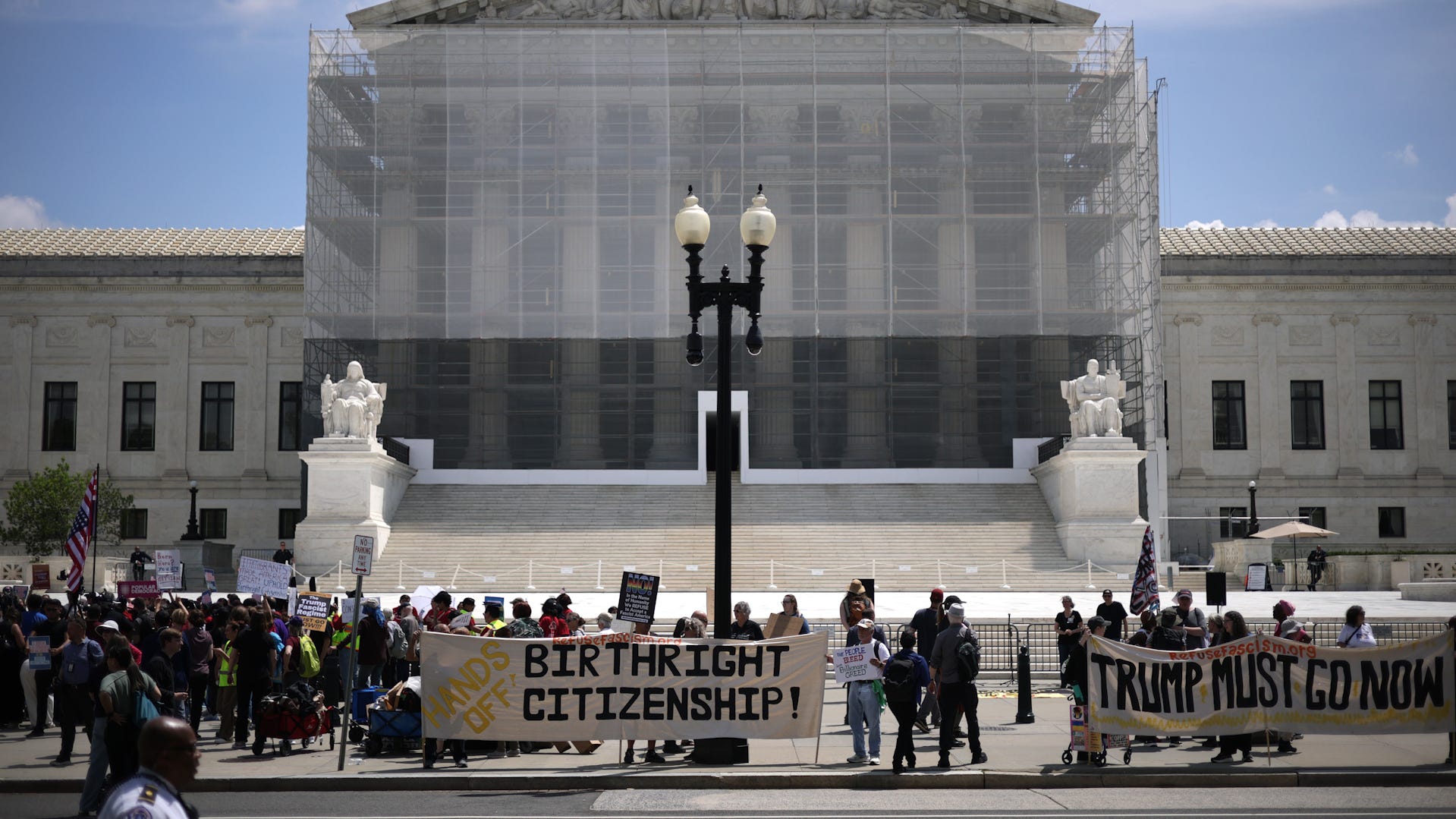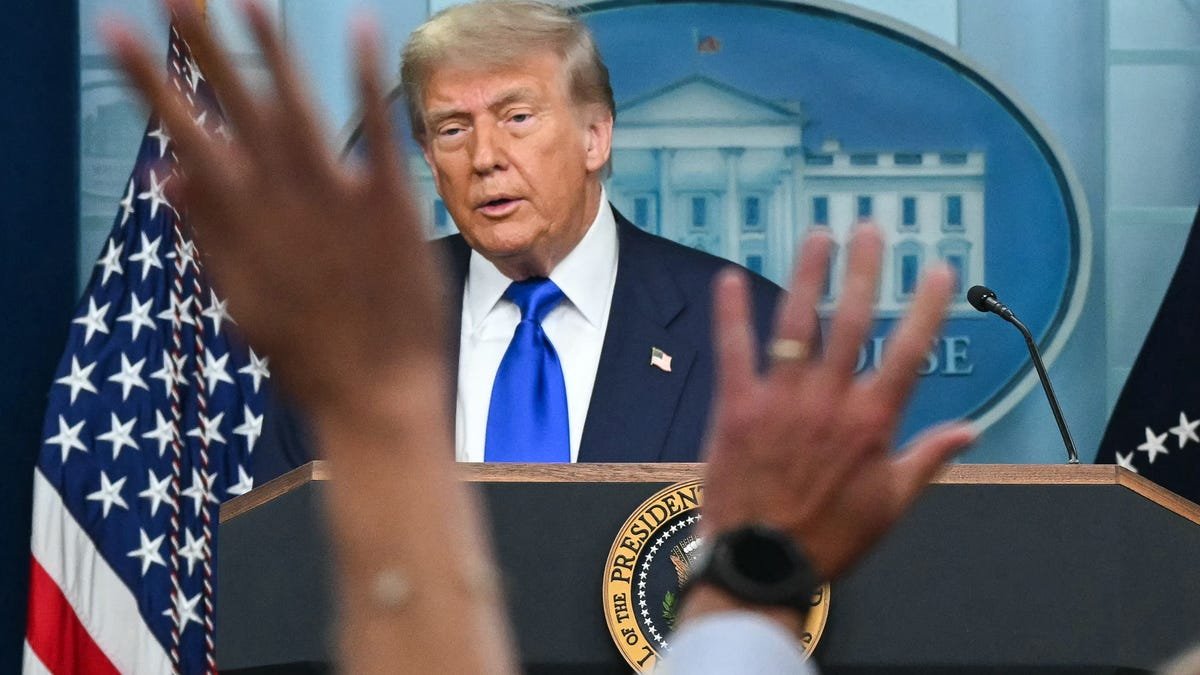Now Reading: Latest on big wins for Trump, Obamacare
-
01
Latest on big wins for Trump, Obamacare
Latest on big wins for Trump, Obamacare

The court ruled 6-3 that district court orders temporarily blocking Trump’s order “likely exceed” their authority.

Supreme Court lifts blocks against Trump birthright citizenship order
A 6-3 Supreme Court decision lifts blocks against President Trump’s order to deny citizenship to babies of undocumented immigrants and visa holders.
- The Supreme Court did not address whether Trump’s attempt to limit birthright citizenship was constitutional. The ruling blocks district judges from making nationwide injuctions against it.
- In a separate ruling, the court denied a challenge to an Obamacare board that determines which preventative care must be covered by insurance companies.
- In a 6-3 decision, the court upheld a Texas law requiring age verification for pornographic web sites.
- In an important religious freedom case, the justices allowed parents to remove their elementary school children from classes where the books include gay characters.
WASHINGTON − The Supreme Court voted to lift temporary blocks on President Donald Trump’s order ending birthright citizenship for the children of parents who were in the country temporarily or without legal authorization.
The court ruled 6-3 that district court rulings temporarily blocking Trump’s order “likely exceed the equitable authority that Congress has granted to federal courts.” It did not decide whether the order is constitutional − a question that is being argued in lower federal courts.
“This was a big decision, one that we’re very happy about,” Trump said later on June 27. “The Constitution has been brought back.”
In other decisions on the last day of the court’s term, the justices ruled against a challenge to an Obamacare provision that forces health insurers to cover certain medicines and services, like HIV-preventive medication and cholesterol-lowering drugs; allowed parents to remove young school children from classes where the books include gay characters; and upheld a Texas law requiring age verification for users of pornographic web content.
Appearing alongside Trump at the White House, Attorney General Pam Bondi took aim at what she called “imperial judges” who have tried to block the Trump administration’s policies. She singled out federal judges in Maryland, Massachusetts, California, Washington and the District of Columbia who ordered 35 of 40 nationwide blocks against Trump’s policies, and noted the high court halted that practice.
“Americans are finally getting what they voted for,” Bondi said. “No longer will we have rogue judges striking down President Trump’s policies across the entire nation.”
Trump admin praises SCOTUS ruling limiting nationwide injunctions
Trump officials praised the Supreme Court’s ruling that limits district judges from issuing nationwide injunctions that blocked key federal policies.
A group fighting Trump’s birthright citizenship order shifted gears to block the president’s restrictions after the Supreme Court struck down nationwide holds by several district judges.
CASA Inc. refiled its lawsuit over the policy as a class action case. Class actions are still subject to nationwide injuctions, the Supreme Court ruled June 27.
CASA asked a federal judge in Maryland to “immediately, without awaiting furtherbriefing, enter a temporary restraining order” against enforcement of Trump’s birthright restrictions, protecting “all children who have been born or will be born in the United States on or after February 19, 2025, who are designated by ExecutiveOrder 14,160 to be ineligible for birthright citizenship…”
President Donald Trump and his top aides are declaring victory over federal judges who have blocked the Republican administration’s policies at unprecedented rates, after the Supreme Court said nationwide decisions from regional judges likely exceed their authority.
“This was a big decision, one that we’re very happy about,” Trump told reporters in a previously-unscheduled White House press conference on June 27. Later, he added, “The Constitution has been brought back.”
The Supreme Court earlier in the day ordered U.S. district court judges to review their orders temporarily blocking Trump policies, in a case about the second-term president’s executive order limiting birthright citizenship for children whose parents were in the country temporarily or without legal authorization.
‘I have great respect for her’: Trump praises Amy Coney Barrett
Supreme Court Justice Amy Coney Barrett has been targeted by some MAGA activists for siding against President Trump, but he had nothing but praises for her after a key decision.
Barrett wrote the majority opinion in a 6-3 decision limiting the use of nationwide injunctions by federal courts, something the Trump administration has railed against.
“I have great respect for her, I always have, and her decision was brilliantly written today,” Trump said June 27 during a press conference celebrating the ruling.
Barrett earlier had ruled against the Trump administration’s efforts to freeze foreign aid funding, drawing criticism from the right.
-Zac Anderson
Justices uphold Texas porn age-verification law
The Supreme Court upheld a Texas law requiring pornographic websites to verify their users are at least 18.
The case pitted concerns about protecting minors against worries about violating the First Amendment rights of adults.
Justice Clarence Thomas wrote for the 6-3 majority that the law survived “because it only incidentally burdens the protected speech of adults.”
Eighteen other, largely conservative states have enacted similar laws in recent years as access to a growing cache of online pornography has exploded and the material has become more graphic.
-Maureen Groppe and Bart Jansen
Supreme Court sides with parents against LGBTQ+ books
The Supreme Court sided with a group of parents who want to withdraw their elementary school children from class when storybooks with LGBTQ+ characters are being read.
In a 6-3 decision that divided along ideological lines, the court said a Maryland public school district’s refusal to allow opt-outs likely burdens parents’ First Amendment right to freely exercise their religion. They said the school must allow opt-outs while the legal challenge continues.
Justice Sonia Sotomayor disagreed with the ruling, saying children of all faiths and backgrounds deserve an education and an opportunity to practice living in our multicultural society.
“That experience is critical to our Nation’s civic vitality,” Sotomayor said. “Yet it will become a mere memory if children must be insulated from exposure to ideas and concepts that may conflict with their parents’ religious beliefs.”
Their decision continues a recent trend of high court rulings backing claims of religious discrimination, sometimes at the expense of other values like gay rights.
-Maureen Groppe and Bart Jansen
The Supreme Court on June 27 upheld an $8 billion federal program that subsidizes high-speed internet and phone service for millions of Americans, rejecting a conservative argument that the program is funded by an unconstitutional tax.
The case was decided by a 6-3 majority, with Justice Elena Kagan writing the opinion.
The court endorsed the way the Federal Communications Commission funds its multi-billion dollar program to expand phone and broadband internet access to low-income and rural Americans and other beneficiaries.
The decision overturned a lower-court ruling that the FCC’s funding mechanism employing mandatory contributions from telecommunications companies had effectively levied a “misbegotten tax” on consumers in violation of the Constitution.
The case raised questions about how much Congress can “delegate” its legislative authority to a federal agency and whether the Supreme Court should tighten that standard.
-Maureen Groppe, Bart Jansen
The court ruled against a challenge to an Obamacare board that determines which preventative care must be covered by insurance companies.
Supreme Court upholds Obamacare task force
The Supreme Court ruled that the Trump administration’s appointment of a Department of Health and Human Services task force is constitutional.
The decision upheld a key part of Obamacare that helps guarantee that health insurers cover preventive care such as cancer screenings at no cost to patients.
Individuals and small businesses had challenged the structure of the task force that makes recommendations about preventive services that insurers would be required to cover at no additional cost to patients.
But Justice Brett Kavanaugh wrote for the 6-3 majority that Health and Human Services Secretary Robert Kennedy Jr. can remove task force members at will and can review their recommendations before they take effect.
Justices Clarence Thomas, Samuel Alito and Neil Gorsuch disagreed.
-Bart Jansen
Supreme Court lifts blocks against Trump birthright order
The Supreme Court decided to lift nationwide blocks on President Donald Trump’s order ending birthright citizenship for the children of parents who were in the country temporarily or without legal authorization.
The court ruled 6-3 that District Court rulings that temporarily blocked Trump’s order “likely exceed the equitable authority that Congress has granted to federal courts.”
Justice Amy Coney Barrett wrote for the majority that the lower courts should review their temporary blocks on Trump’s policy. She explicitly said the court wasn’t deciding whether Trump’s order was constitutional.
-Bart Jansen
Several important Supreme Court decisions will be announced after 10 a.m. Eastern time on June 27. These will be the final rulings of court’s current term.
The opinions will be announced in order of the author, with the most junior justice going first.
The justice who wrote the opinion will read a summary of the decision, which usually takes several minutes. If there’s a dissenting opinion, that may also be summarized but is usually done only in major cases.
That’s happened only once so far this term. Justice Sonia Sotomayor read parts of her dissent from the majority’s opinion upholding Tennessee’s ban on gender affirming care for minors.
-Maureen Groppe
Supreme Court to issue decision in birthright citizenship case
One of the most hotly anticipated Supreme Court decisions of the year deals with President Donald Trump’s order ending birthright citizenship for the children parents who were in the country temporarily or without legal authorization.
But how the justices will resolve case is anyone’s guess.
The Justice Department asked the high court to ignore for now the constitutionality of Trump’s executive order. Instead, the department asked the justices to allow his order signed his first day back in office to go into effect while the case is litigated.
But states and immigration advocates contend the order is clearly unconstitutional under the 14th Amendment. Lower courts in three states temporarily halted Trump’s order while the cases are argued.
The justices could lift the pause on those lower-court rulings – or not. Or fully decide Trump’s order is constitutional – or not. Or ask for more arguments for the next court session beginning in October. Or maybe something else.
-Bart Jansen
Retired Justice Kennedy warns ‘freedom is at risk’ in threats to judges
Retired Supreme Court Justice Anthony Kennedy warned “freedom is at risk” as he expressed concern about the “tone of our political discourse” as he defended the role judges play.
Kennedy made his comments during an online forum June 26 called “Speak Up for Justice,” which featured judges from other countries warning about how attacks on courts can threaten democracies.
“And if they see a hostile, fractious discourse, if they see a discourse that uses identity politics rather than to talk about issues, democracy is at risk,” Kennedy said. “Freedom is at risk.
Kennedy, who was appointed by former President Ronald Reagan and retired during President Donald Trump’s first term, stressed that the rest of the world looks “to the United States to see what democracy is, to see what democracy ought to be.”
-Reuters
The latest challenge to the Affordable Care Act takes aim at 2010 law’s popular requirement that insurers cover without extra costs preventive care such as cancer screenings, cholesterol-lowering medication and diabetes tests.
Two Christian-owned businesses and some people in Texas argue that the volunteer group of experts that recommends the services health insurance must cover is so powerful that, under the Constitution, its members must be appointed by the president and confirmed by the Senate.
Supreme Court rarely divides along strict ideological lines
The Supreme Court decided only three cases out of more than 60 decisions along strict ideological lines during the current year-long term ending June 27.
The three cases so far decided on votes of the six justices appointed by Republicans and opposed by three justices appointed by Democrats were:
-Bart Jansen
Who is on the Supreme Court?
The Supreme Court has nine justices:
Six of the nine justices were appointed by Republican presidents and three by Democrats. But their rulings often do not split along strictly ideological lines, other than in political cases or those involving thorny cultural issues.
-Bart Jansen and Anna Kaufman
The Supreme Court still has to decide the last of three cases brought this year by religious groups. The justices will say if parents should be allowed to remove their elementary school children from class when storybooks with LGBTQ+ characters are being read.
















































